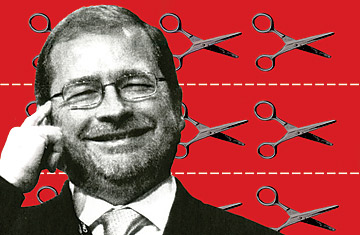
The story has become Washington legend. Grover Norquist, who apparently was a Republican when he was a zygote, came up with the idea for the no-tax pledge in high school. "I had this history teacher who said that most people don't know who their Congressman is," Norquist told me, over coffee, as the President and Congress wrangled about the debt-ceiling limit — an argument Norquist probably has done more to precipitate than any other person in our nation's capital. "I had this insight: What if you could brand the Republican Party like Coke or Pepsi? What if it was defined as the no-tax party? Then people would know what they were getting."
The rest really is history. No congressional Republican has voted for a major tax increase since 1991. All but six of the current 240 Republican members of the House and all but seven of the 47 Republican Senators have signed his pledge. Norquist has redefined the Republicans, for good and ill, as the no-tax party. The Democrats have no similar self-imposed litmus test. These bare facts make Norquist one of the most important nonelected power brokers in American history.
Grover Norquist is 54 but looks decidedly younger. He has a soft, thin voice, a beard and an academic mien occasionally broken by ecstatic flights of hubristic exaggeration. He once said he wanted to make government so small that he could take it to the bathtub and drown it. This may have been an attempt at humor: Norquist placed third in the Washington's Funniest Celebrity contest last year, which may be all you need to know about hilarity there. I am pretty sure that he would not mind being described as a former nerd. In junior high school, he bought and devoured anticommunist classics like Herbert Philbrick's I Led Three Lives and Whittaker Chambers' Witness for 10¢ each at a library sale. "I was an anticommunist long before I was an economic conservative," he says.
After working his way up through the Republican ranks, Norquist was asked by Ronald Reagan's White House to lead Americans for Tax Reform in 1985 to lobby for the bipartisan tax-reform plan, which lowered income tax rates by closing loopholes. Norquist announced the no-tax pledge in 1986, and Reagan went around the country promoting congressional candidates who signed it. The pledge really became a big deal in 1988, when all the Republican candidates for President except Bob Dole signed on. Dole won the Iowa caucuses and proceeded to lose the New Hampshire primary after he refused to sign a Norquist pledge handed to him by Delaware's Pete du Pont during a debate a few days before the election. It has been a big deal ever since.
Norquist describes himself as a "Fabian libertarian," after Fabius, the Roman who defeated Hannibal and who was a gradualist, not an extremist — another attempt at humor, perhaps. "When Samuel Gompers [who founded the American Federation of Labor] was asked what he wanted, he said, 'More,'" Norquist says. "My political philosophy is the opposite: less." Except in the case of taxes, about which his philosophy is "Nope." This "less'' business is clever. It enables Norquist to avoid specific questions like, Do you think we should eliminate Social Security, or Medicare, or food stamps? "If we're talking about a house of cards here," he says, "my position is you take a couple of cards from the top rather than taking a few from the bottom and collapsing the whole thing." He believes this makes him a moderate.
There is one serious problem with Norquist's antitax fetishism, however. It makes more sense as a marketing ploy than as public policy. Indeed, increasing taxes in a reasonable way doesn't seem to have much effect on the economy at all. Reagan signed a tax increase — yes, a stiff tax increase, the first of three by the Gipper — as a deep recession was coming to an end in 1982 ... and the economy boomed. The same thing happened after Bill Clinton's 1993 tax increase. Confronted with the tax history of the past 30 years, Norquist concedes immediately, "Even if it's a toss-up on that question, there's still the question of liberty. Taxes are a limitation on liberty. You are stealing money from some people to give it to others."
Stealing? Actually, in this democracy, there is something called the consent of the governed. If the public wants to provide health care for the elderly, as Newt Gingrich opined in the first Republican presidential debate, it is probably a good idea. In normal times, the corollary principle should be: if you decide to spend the money (on all but long-term capital investments), you have to figure out how to pay for it. That defines a brand more powerful than either party. It used to be called the American way.
